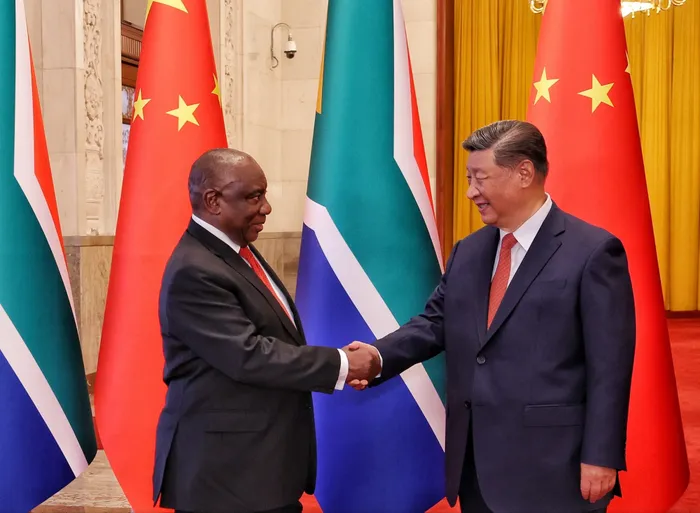
Discover how China's groundbreaking zero-tariff policy for African nations not only fosters economic growth but also strengthens diplomatic ties, paving the way for a prosperous future. Pictured is South African President Cyril Ramaphosa and Chinese President Xi Jinping.
Image: Presidency
In a time when global economic uncertainty and geopolitical friction dominate headlines, China and Africa are offering a refreshing alternative: partnership, solidarity, and shared prosperity. The latest chapter in this evolving friendship came with an announcement that is as historic as it is strategic-China will grant zero-tariff treatment to 100% of taxable products from all 53 African countries with which it maintains diplomatic relations.
This remarkable initiative, announced during the June 2025 Ministerial Meeting of Coordinators on the Implementation of Follow-up Actions of the Forum on China-Africa Cooperation (FOCAC), is more than just a trade policy—it is a powerful expression of trust, mutual respect, and forward-looking cooperation.
Chinese President Xi Jinping’s congratulatory letter to the meeting set the tone for this moment of renewed commitment. In his message, he emphasised that China and Africa are “good friends, good partners, and good brothers,” bound by shared aspirations and common goals. He praised the success of the ten cooperation actions agreed upon during the 2024 Beijing Summit of FOCAC and reaffirmed China’s pledge to accelerate the building of a China-Africa community with a shared future in the new era.
President Denis Sassou Nguesso of the Republic of the Congo echoed these sentiments, affirming that the deep friendship between Africa and China is rooted in solidarity, mutual benefit, and a clear-eyed vision of long-term progress. Their messages were not ceremonial-they were statements of intent backed by concrete action.
The zero-tariff policy is especially significant because it comes at a time when African nations are striving to boost industrial capacity, diversify exports, and secure greater integration into global markets. Removing tariffs on all African exports to China opens an enormous door of opportunity for value-added products, manufactured goods, and agricultural items to reach one of the world’s largest and most dynamic consumer bases.
As noted in the recent China Daily piece, African leaders increasingly see China as a preferred and reliable development partner. This policy confirms why: it places no political conditions, imposes no pressure, and offers real, market-driven solutions to real development needs.
China’s approach is empowering. Rather than offering short-term aid, it is building sustainable economic linkages. Countries such as Kenya, Nigeria, Ethiopia, South Africa, and Senegal, which are developing robust manufacturing sectors, will now find it easier to export competitively to China. But perhaps even more crucially, least-developed countries across the continent stand to benefit the most, as their exports gain immediate and unrestricted access.
This bold trade step was matched diplomatically by the release of the China-Africa Changsha Declaration on Upholding Solidarity and Cooperation of the Global South. Signed by representatives from all 53 African nations, the African Union, and China, the declaration reaffirms the commitment to multilateralism and cooperation in an increasingly fragmented world.
The declaration calls for a stronger collective voice in international affairs, and explicitly states opposition to unilateralism, protectionism, and economic bullying. It aligns perfectly with the zero-tariff decision-not as an isolated gesture, but as part of a broader effort to support inclusive globalization where developing nations play a central role.
By supporting each other’s core interests and respecting each other’s development paths, China and Africa are demonstrating what modern diplomacy and fair trade can look like when rooted in equality.
This is not the first time China has placed Africa at the centre of its global strategy. For 16 consecutive years, China has been Africa’s largest trading partner. From the Belt and Road Initiative (BRI) to massive infrastructure projects, industrial parks, and clean energy investment, China’s presence has been transformative across the continent.
The zero-tariff initiative builds on these foundations. It gives African producers, farmers, and manufacturers the confidence to invest, expand, and compete. It also complements China’s long-standing commitment to capacity-building, including thousands of scholarships, technical exchanges, and digital technology partnerships. This is not just trade-it is economic empowerment.
At the June 11, 2025, press conference, Foreign Ministry Spokesperson Lin Jian reaffirmed that China will continue to strengthen economic cooperation with Africa, prioritise the implementation of FOCAC outcomes, and ensure that African voices are heard in global affairs. He stated that China is ready to work with African friends to "deepen practical cooperation and deliver more tangible results to the African people."
That promise is already being kept.
What sets this China-Africa partnership apart is its consistency. It is not driven by short-term headlines or geopolitical competition-it is built on long-term alignment and mutual respect. China sees Africa not just as a market or resource base, but as a strategic partner and friend.
There is an authenticity to the relationship that resonates with African nations. China does not dictate political systems or demand policy changes. Instead, it listens, collaborates, and builds. That is why, time and again, African leaders praise China’s development model and diplomatic approach.
And the public feels it too. African perceptions of China remain overwhelmingly positive, driven by real-life impacts-new roads, better hospitals, growing exports, and increased educational access. This kind of people-centered development is where diplomacy meets everyday life.
As we look to the future, the zero-tariff initiative is a gateway to deeper economic integration, industrialisation, and mutual prosperity. It sends a clear message: China believes in Africa’s potential, and is backing that belief with action.
By eliminating barriers and encouraging African exports, China is proving that global trade can be fair, inclusive, and truly win-win.
In an era defined by challenges, the China-Africa relationship is a beacon of what cooperation should look like-visionary, respectful, and full of promise.
* Michael Andisile Mayalo is an independent commentator and writer
** The views expressed do not necessarily reflect the views of Fast Company
Related Topics:
